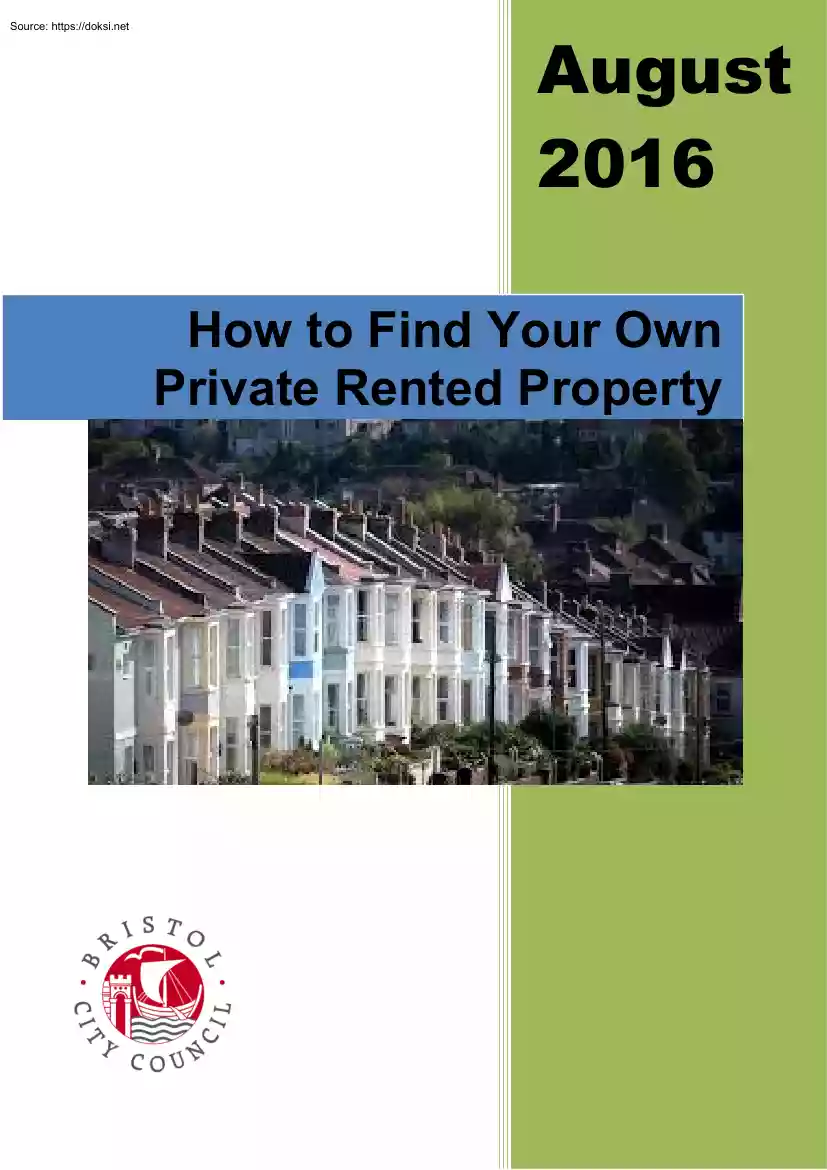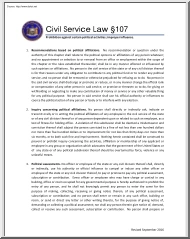Értékelések
Nincs még értékelés. Legyél Te az első!
Mit olvastak a többiek, ha ezzel végeztek?
Tartalmi kivonat
August 2016 How to Find Your Own Private Rented Property Finding Private Rented Accommodation A guide to help you to find your new home WHAT IS THE PRIVATE RENTED SECTOR? The term ‘private rented sector’ means properties that are owned by private individual(s) and rented out to single people and/or families. This is different from owning your own home, or ‘social rented housing’ which refers to properties that are owned and rented out by housing associations or the council. WHY RENT A PROPERTY FROM A PRIVATE LANDLORD? There are many reasons why you may choose to live in the private rented sector. A few of the main ones are: Choice There is a range of properties in different areas available to you; and the private rented sector is expanding, which means there are more and more properties available in a wider range of areas. Availability Renting can be considerably cheaper, in the short term, than buying your own house. Mobility When renting in this sector you can
usually get into and out of a tenancy fairly quickly, which means you can move around more easily should you need to do so. Lack of social housing There is a very limited number of properties to rent through the council or housing associations. Looking for a new home can be stressful and overwhelming, so we have written this fact sheet to help you to find a home for you and your family. You will need to search daily and be flexible because it is unlikely that you will find your ideal home exactly where you want to live. However if you’re persistent and pleasant to the landlords and lettings agents you contact, this should eventually get results for you. TOP TIPS • Always bear in mind that landlords and lettings agents always look for good tenants – people who are reliable, will keep the property in good condition and pay the rent. There is a huge demand for private rented accommodation in Bristol so the better you are able to present yourself, the more likely it is that
landlords and agents will be impressed. • Ring landlords and agents – It will usually take more than a couple of phone calls before you’re viewing properties and you shouldn’t expect lettings agents always to ring you back. Making regular, polite and relaxed calls is a very good idea. • Don’t contact just one or two lettings agencies – Keep regular track of all the agencies that serve the areas you want to live in; make sure you’re checking local newspapers, websites, community noticeboards, shop windows and so on. The wider you search, the more likely you will be successful. • When viewing properties look presentable, be on time, be friendly, and make sure you have any particular questions written down and ready to ask. • If you have previous landlord references or something similar to show that you’re a good tenant, make copies and show them to landlords and agents. • Before signing anything, always view a property and raise any questions or concerns
you have, making sure these are answered. • You should make the widest choice possible of the areas you’d be willing to live in to give yourself the best chance of finding somewhere suitable. Consider outlying areas of Bristol that have good transport links there may be less demand for them and lower rents than more central areas. • Make sure you can afford the property. You need to be sure that you will be able to pay the monthly rent. If you are wholly or partly dependent on Housing Benefit then the section on HB should help you. NB Local Housing Allowance (LHA) is the Housing Benefit payable for private sector rentals. You should be very clear about the size of property you need, how many bedrooms and where you are prepared to live. You may need to compromise but where housing is concerned, most people have to; and please remember: what you want isn’t always what you need. WHERE TO LOOK You should check daily: - Local lettings agencies and landlords - Websites -
Local newspapers - Shop windows, community noticeboards, supermarket boards etc. We recommend that as a minimum you keep checking regularly: The Bristol Post and Trade-It papers, also accessible via the internet: http://www.bristolpostcouk www.tradeitcouk And search daily the following websites: www.rightmovecouk www.dssmovecouk www.bristolgumtreecom www.thisisbristolcouk - and follow the link for classifieds www.letsbristolcouk www.nestoriacouk http://uk.easyroommatecom www.spareroomcouk Other websites also advertise properties to let and rooms in shared houses. Ask family and friends to keep their eyes and ears open for you. The more people you have helping you, the better! LETTING AND MANAGEMENT AGENTS Agents manage properties on behalf of many private landlords. Agents should not charge you to just to look for a property. If you find a property through an agent you will often be charged a fee – usually one third of a month’s rent plus VAT. This fee may be non-refundable. They
will also require a deposit and up to two months’ rent in advance. Some agents may require a credit check and / or references Bristol City Council cannot recommend individual letting and management agents, but there are many lettings agencies and even more landlords who cover the Greater Bristol area. The list is long and you can find many on the Rightmove website (see above). Renting a property through a letting agency can be expensive initially due to fees and level of deposit required. The cheaper alternative is to deal directly with a landlord. As well as avoiding fees, you may be able to negotiate a smaller deposit or flexibility in your first rent payments. Renting a room in a shared house can be a good option, as vacancies occur regularly as individuals move out. HOUSING BENEFIT April 2015 – March 2016 LHA maximum rates are: Shared Room Rate (if you’re under 35) 1 Bedroom 2 Bedroom 3 Bedroom 4 Bedroom £291.74 £525.16 £656.50 £761.54 £1050.10 •
Be certain about the property size you can afford. Where Housing Benefit (LHA) is concerned, it is based on your household size. Housing Benefit rules are that you need one bedroom for each of the following: A couple who live together Someone else in the household who is 16 or over Two children of the same sex (a child is a person under 16 years old) Two children of any sex who are younger than 10 So, an example would be Mum and Dad (1 bedroom), a girl of three and a boy of 5 (1 bedroom), a boy of 13 (unpaired person) (1 bedroom) and a 17 year old older sister (1 bedroom).This family therefore has a 4 bedroom need and may be able to claim LHA up to a maximum monthly payment of £1052.98 NB Even if you have a 5 or 6 bedroom need, you cannot claim LHA for more than the 4-bedroom rate. Also remember that Housing Benefit is paid two weeks in arrears, so cannot be used to pay for rent in advance. If you are under 35 and single If you are under 35 and renting from a private
landlord your Housing Benefit is restricted to the ‘shared room rate’ (see the table above). In practical terms this means the rent charged for a room in a shared house or bedsit. Single room rent does not apply to couples or people living with their children You may be exempt from single room rent up to your 22nd birthday if you were in care, or exempt up to your 25th birthday if claiming certain health benefits. If you are 25-35 and have lived for 3 months or more in some kind of supported housing or hostel for homeless people, at any time you may be exempt from this restriction. WHAT SHOULD YOU FIND OUT? When viewing properties and especially before signing a tenancy agreement, make sure you know: • How long is the tenancy agreement? It has to be at least 6 months and may last much longer than this but do ask. • How much the rent is? When is it paid (weekly or monthly)? What is included in the rent i.e does it include council tax or utility bills? •
Will the landlord accept Housing Benefit? You are not under any obligation to tell a landlord or letting agent that you claim HB BUT it could become quite difficult for you if you don’t. For example: There will be a wait before your HB claim is processed and paid. Can you afford to pay rent during this wait? If your circumstances change during your tenancy i.e you start work, you may find that your HB payments are suspended while you provide evidence of your new income. Can you afford to pay the whole rent during this period? It might be better to be clear with your landlord that you claim HB, have just found work and there may be a delay in rent payment. - • What are the upfront charges (agency fees, rent in advance and deposit)? See the section ‘What Other Costs Should You Expect?’) • Does the property have the necessary gas safety certificate? They are valid for 12 months. Ask to see it A rented property must have a valid one for the let to be legal. • Does the
property have an Energy Performance certificate? This is also a legal requirement and your heating costs might be high if the performance rating is low. • Does the property have an electrical safety certificate? This is not yet a legal requirement but you should seek reassurance that the electrical wiring, fittings and fuse box are safe. • Does the property require a licence from the council? Larger houses in multiple occupation (HMO’s) of 3 or more storeys with 5 or more individuals sharing facilities and dwellings located in certain areas require a licence. For further information go to: http://www.bristolgovuk/page/housing/propertylicences • Does the property have smoke detectors or a fire alarm system? • Will the landlord allow pets? Many don’t. • Is any furniture provided and has it been fire checked? • Be sure about (public) transport, schools and shops. Can you get to where you need to go easily enough? WHAT OTHER COSTS SHOULD YOU EXPECT? Agency
Fees Please see the notes about this under ‘Letting and Management Agents’. Rent in advance This is usually 1 month’s rent paid in advance before you move into the tenancy. You are very likely to need to find this money in advance, so think seriously about taking a loan from your credit union, a trusted friend or family member, or your bank. If you are a Bristol Credit Union member you may be able to secure an interest free loan with affordable monthly repayment terms. Deposit This is usually the equivalent of 1 or 2 months’ rent and must be protected by the landlord or agent by an independent deposit protection scheme. In the event of damage, rent arrears or if you break the terms of the tenancy agreement, the landlord may make a claim against part or all of your deposit. Council Tax You can find out which band of council tax your chosen property falls into through the following website: https://www.govuk/council-tax And you can find out how much the bill is likely to
be through the following site: http://www.bristolgovuk/nav/council-tax Tel: 0117 922 2900 Water and Sewerage Rates Costs will depend on whether the property is on a meter or not. For more information about water rates you can visit: www.bristolwatercouk Tel: 0845 600 3600 Gas and Electricity The property will have either a credit or prepayment meter. A credit meter is where you will be billed quarterly for the energy you have consumed. Prepayment meters are usually cashless and use an electronically-coded token or key, which record how much credit you have available for energy in the home. You can top up these keys at local shops and post offices. There are a large number of energy suppliers – you may want to compare prices to see who will offer the best deal. There are a number of price comparison websites Ongoing and additional costs You will need to find out from the landlord or agent what extra costs you will have to pay in addition to your rent. You will need to know and
understand what all the costs are before taking on a new tenancy to know whether or not you can afford the property. Guarantors Some lettings agencies ask for a guarantor. This is someone who guarantees that s/he will pay the rent if you can’t or don’t. If a guarantor is needed, it is likely that s/he will need to be a home owner and/or someone earning at least £25,000 per year. Olly Alcock, Accommodation Services Manager, 31st August 2016
usually get into and out of a tenancy fairly quickly, which means you can move around more easily should you need to do so. Lack of social housing There is a very limited number of properties to rent through the council or housing associations. Looking for a new home can be stressful and overwhelming, so we have written this fact sheet to help you to find a home for you and your family. You will need to search daily and be flexible because it is unlikely that you will find your ideal home exactly where you want to live. However if you’re persistent and pleasant to the landlords and lettings agents you contact, this should eventually get results for you. TOP TIPS • Always bear in mind that landlords and lettings agents always look for good tenants – people who are reliable, will keep the property in good condition and pay the rent. There is a huge demand for private rented accommodation in Bristol so the better you are able to present yourself, the more likely it is that
landlords and agents will be impressed. • Ring landlords and agents – It will usually take more than a couple of phone calls before you’re viewing properties and you shouldn’t expect lettings agents always to ring you back. Making regular, polite and relaxed calls is a very good idea. • Don’t contact just one or two lettings agencies – Keep regular track of all the agencies that serve the areas you want to live in; make sure you’re checking local newspapers, websites, community noticeboards, shop windows and so on. The wider you search, the more likely you will be successful. • When viewing properties look presentable, be on time, be friendly, and make sure you have any particular questions written down and ready to ask. • If you have previous landlord references or something similar to show that you’re a good tenant, make copies and show them to landlords and agents. • Before signing anything, always view a property and raise any questions or concerns
you have, making sure these are answered. • You should make the widest choice possible of the areas you’d be willing to live in to give yourself the best chance of finding somewhere suitable. Consider outlying areas of Bristol that have good transport links there may be less demand for them and lower rents than more central areas. • Make sure you can afford the property. You need to be sure that you will be able to pay the monthly rent. If you are wholly or partly dependent on Housing Benefit then the section on HB should help you. NB Local Housing Allowance (LHA) is the Housing Benefit payable for private sector rentals. You should be very clear about the size of property you need, how many bedrooms and where you are prepared to live. You may need to compromise but where housing is concerned, most people have to; and please remember: what you want isn’t always what you need. WHERE TO LOOK You should check daily: - Local lettings agencies and landlords - Websites -
Local newspapers - Shop windows, community noticeboards, supermarket boards etc. We recommend that as a minimum you keep checking regularly: The Bristol Post and Trade-It papers, also accessible via the internet: http://www.bristolpostcouk www.tradeitcouk And search daily the following websites: www.rightmovecouk www.dssmovecouk www.bristolgumtreecom www.thisisbristolcouk - and follow the link for classifieds www.letsbristolcouk www.nestoriacouk http://uk.easyroommatecom www.spareroomcouk Other websites also advertise properties to let and rooms in shared houses. Ask family and friends to keep their eyes and ears open for you. The more people you have helping you, the better! LETTING AND MANAGEMENT AGENTS Agents manage properties on behalf of many private landlords. Agents should not charge you to just to look for a property. If you find a property through an agent you will often be charged a fee – usually one third of a month’s rent plus VAT. This fee may be non-refundable. They
will also require a deposit and up to two months’ rent in advance. Some agents may require a credit check and / or references Bristol City Council cannot recommend individual letting and management agents, but there are many lettings agencies and even more landlords who cover the Greater Bristol area. The list is long and you can find many on the Rightmove website (see above). Renting a property through a letting agency can be expensive initially due to fees and level of deposit required. The cheaper alternative is to deal directly with a landlord. As well as avoiding fees, you may be able to negotiate a smaller deposit or flexibility in your first rent payments. Renting a room in a shared house can be a good option, as vacancies occur regularly as individuals move out. HOUSING BENEFIT April 2015 – March 2016 LHA maximum rates are: Shared Room Rate (if you’re under 35) 1 Bedroom 2 Bedroom 3 Bedroom 4 Bedroom £291.74 £525.16 £656.50 £761.54 £1050.10 •
Be certain about the property size you can afford. Where Housing Benefit (LHA) is concerned, it is based on your household size. Housing Benefit rules are that you need one bedroom for each of the following: A couple who live together Someone else in the household who is 16 or over Two children of the same sex (a child is a person under 16 years old) Two children of any sex who are younger than 10 So, an example would be Mum and Dad (1 bedroom), a girl of three and a boy of 5 (1 bedroom), a boy of 13 (unpaired person) (1 bedroom) and a 17 year old older sister (1 bedroom).This family therefore has a 4 bedroom need and may be able to claim LHA up to a maximum monthly payment of £1052.98 NB Even if you have a 5 or 6 bedroom need, you cannot claim LHA for more than the 4-bedroom rate. Also remember that Housing Benefit is paid two weeks in arrears, so cannot be used to pay for rent in advance. If you are under 35 and single If you are under 35 and renting from a private
landlord your Housing Benefit is restricted to the ‘shared room rate’ (see the table above). In practical terms this means the rent charged for a room in a shared house or bedsit. Single room rent does not apply to couples or people living with their children You may be exempt from single room rent up to your 22nd birthday if you were in care, or exempt up to your 25th birthday if claiming certain health benefits. If you are 25-35 and have lived for 3 months or more in some kind of supported housing or hostel for homeless people, at any time you may be exempt from this restriction. WHAT SHOULD YOU FIND OUT? When viewing properties and especially before signing a tenancy agreement, make sure you know: • How long is the tenancy agreement? It has to be at least 6 months and may last much longer than this but do ask. • How much the rent is? When is it paid (weekly or monthly)? What is included in the rent i.e does it include council tax or utility bills? •
Will the landlord accept Housing Benefit? You are not under any obligation to tell a landlord or letting agent that you claim HB BUT it could become quite difficult for you if you don’t. For example: There will be a wait before your HB claim is processed and paid. Can you afford to pay rent during this wait? If your circumstances change during your tenancy i.e you start work, you may find that your HB payments are suspended while you provide evidence of your new income. Can you afford to pay the whole rent during this period? It might be better to be clear with your landlord that you claim HB, have just found work and there may be a delay in rent payment. - • What are the upfront charges (agency fees, rent in advance and deposit)? See the section ‘What Other Costs Should You Expect?’) • Does the property have the necessary gas safety certificate? They are valid for 12 months. Ask to see it A rented property must have a valid one for the let to be legal. • Does the
property have an Energy Performance certificate? This is also a legal requirement and your heating costs might be high if the performance rating is low. • Does the property have an electrical safety certificate? This is not yet a legal requirement but you should seek reassurance that the electrical wiring, fittings and fuse box are safe. • Does the property require a licence from the council? Larger houses in multiple occupation (HMO’s) of 3 or more storeys with 5 or more individuals sharing facilities and dwellings located in certain areas require a licence. For further information go to: http://www.bristolgovuk/page/housing/propertylicences • Does the property have smoke detectors or a fire alarm system? • Will the landlord allow pets? Many don’t. • Is any furniture provided and has it been fire checked? • Be sure about (public) transport, schools and shops. Can you get to where you need to go easily enough? WHAT OTHER COSTS SHOULD YOU EXPECT? Agency
Fees Please see the notes about this under ‘Letting and Management Agents’. Rent in advance This is usually 1 month’s rent paid in advance before you move into the tenancy. You are very likely to need to find this money in advance, so think seriously about taking a loan from your credit union, a trusted friend or family member, or your bank. If you are a Bristol Credit Union member you may be able to secure an interest free loan with affordable monthly repayment terms. Deposit This is usually the equivalent of 1 or 2 months’ rent and must be protected by the landlord or agent by an independent deposit protection scheme. In the event of damage, rent arrears or if you break the terms of the tenancy agreement, the landlord may make a claim against part or all of your deposit. Council Tax You can find out which band of council tax your chosen property falls into through the following website: https://www.govuk/council-tax And you can find out how much the bill is likely to
be through the following site: http://www.bristolgovuk/nav/council-tax Tel: 0117 922 2900 Water and Sewerage Rates Costs will depend on whether the property is on a meter or not. For more information about water rates you can visit: www.bristolwatercouk Tel: 0845 600 3600 Gas and Electricity The property will have either a credit or prepayment meter. A credit meter is where you will be billed quarterly for the energy you have consumed. Prepayment meters are usually cashless and use an electronically-coded token or key, which record how much credit you have available for energy in the home. You can top up these keys at local shops and post offices. There are a large number of energy suppliers – you may want to compare prices to see who will offer the best deal. There are a number of price comparison websites Ongoing and additional costs You will need to find out from the landlord or agent what extra costs you will have to pay in addition to your rent. You will need to know and
understand what all the costs are before taking on a new tenancy to know whether or not you can afford the property. Guarantors Some lettings agencies ask for a guarantor. This is someone who guarantees that s/he will pay the rent if you can’t or don’t. If a guarantor is needed, it is likely that s/he will need to be a home owner and/or someone earning at least £25,000 per year. Olly Alcock, Accommodation Services Manager, 31st August 2016





 Útmutatónk teljes körűen bemutatja az angoltanulás minden fortélyát, elejétől a végéig, szinttől függetlenül. Ha elakadsz, ehhez az íráshoz bármikor fordulhatsz, biztosan segítségedre lesz. Egy a fontos: akarnod kell!
Útmutatónk teljes körűen bemutatja az angoltanulás minden fortélyát, elejétől a végéig, szinttől függetlenül. Ha elakadsz, ehhez az íráshoz bármikor fordulhatsz, biztosan segítségedre lesz. Egy a fontos: akarnod kell!